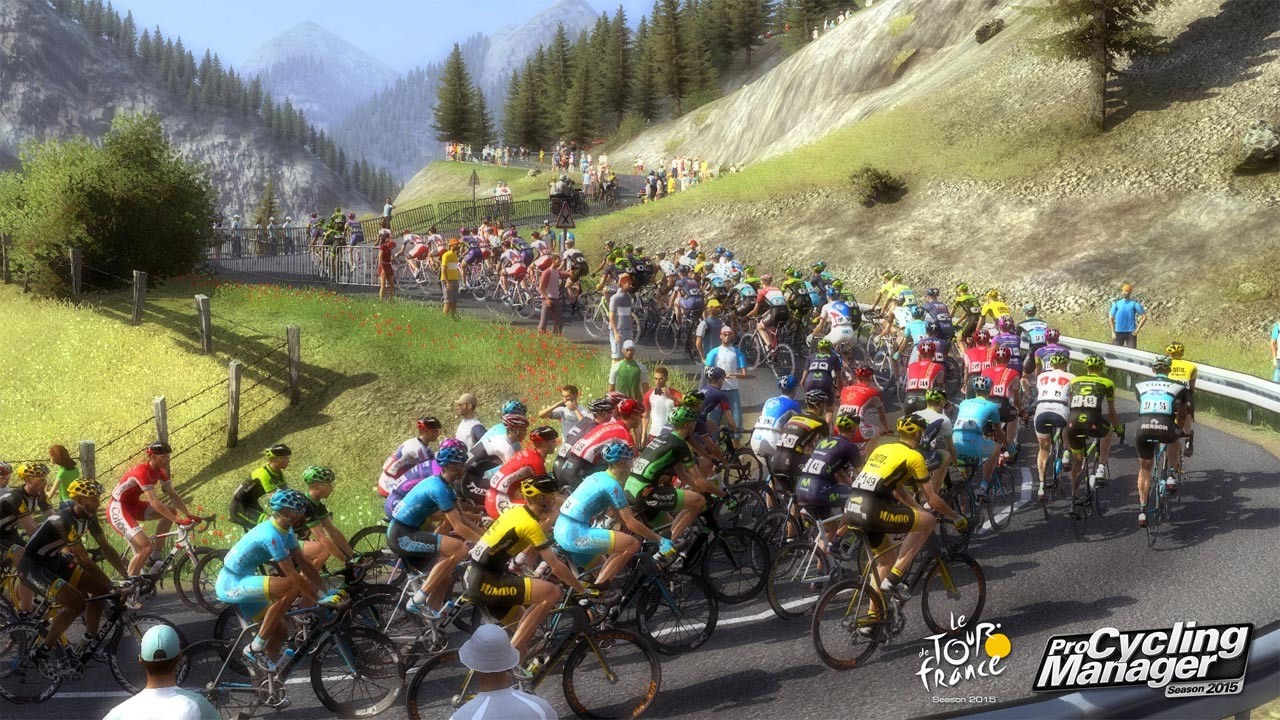An Ode to Pro Cycling Manager

In 2016, during a steam sale, I made a slightly strange purchase. For what could not have been more than £3 I bought Pro Cycling Manager 2015. I've always been a fan of sports management sims, and I had a decent interest in cycling, and for £3 it's not the end of the world if I don't enjoy it, so I pulled the trigger on a year old game from a franchise I'd never heard of.
As of 18/04/2018, I have 493 hours logged on steam.
While on the face of it sports management simulators can seem boring, with a narrow appeal, they act like any other computer game. Games rely on two things to engage the player, atmosphere and feedback. Atmosphere can be built in a number of ways. All gamers have had that moment in a game where they walk into the final corridor before a boss, and the combination of audio and visual cues raises your heart rate and gives you that feeling of "right now it's about to go down and I'm nervous". A good sports management sim can do that too. I genuinely had to quit the game before a big stage of the Giro D'Italia because I didn't feel ready to take it on and wanted to come back fresher the next day. The big races feel important, they are decided on small things that you can do right but you can miss or get wrong and that pressure is important in a game which isn't going to have visually spectacular set pieces of fun little gameplay loops.
Feedback is the other really important feature in a game. Any game you play where you fail at your task, and you don't come away thinking "oh I shouldn't have done that" has failed at its job. To keep logging back on you want to feel like you can get better, like you have things to try that will lead to rewards. Pro Cycling Manager does that well, as you get to see the whole race and all the riders in it just at a much faster speed than a real bike race. You see when the attacks go, you see when your rider was dropped, you can see what kinds of riders succeed when the ones you selected failed. There's a couple of things you can't help, if you get a puncture or crash, there's very little you can do to stop that (though a few things to mitigate the effects). There's also obviously stronger riders and weaker riders, and a climber with an average of 65 isn't going to beat a climber with an average of 80 on a mountain stage 99% of the time, but you can bridge smaller stat gaps through strategy often.
Pro Cycling Manager changed my relationship with cycling
When I got the game I was someone who would watch the grand tours, the world championships and the olympics, and the occasional major classic if I had the correct tv service at the time. I appreciated the sport enjoyed riding my bike but I didn't engage with it obsessively like I do now. Playing this game gave me an appreciation for the structure of the season, how the races lead into one another. It gave me an appreciation for small races with interesting routes and histories in their own right. It gave me an appreciation for less heralded riders, the guys on the team who's job was never to win, and how they actually influenced races. I'm far more interested in cycling now than I was 493 hours of playing the game ago.
A game that rewards the player
I mentioned how the game gives useful feedback earlier, but what makes this a great example of the genre is how powerful you feel as a manager. As with many games of this type, building a roster of athletes that can cover all eventualities to an elite level is hard, but if you focus on specific areas you can punch above your budget in certain races. By winning more, and winning things your sponsors ask for, you get more budget to challenge for bigger and harder races. It also rewards knowledge of the sport, as conventional strategies from real life still work to a large extent, and the AI can be pushed around by aggressive strategies. There's also a sense you get back what you put in in the game, the more hands on you get with the training programmes and fitness objectives the more specific your riders performances will get. It's not necessary to enjoy the game but it's nice when games give you that option.
small issues
It's not perfect. Because the game has to speed up the races, sprints and sprint trains cover larger distances. While on flat stages this isn't a huge problem it does mean certain courses vary in character from real life. The game uses a bit more computing power than ideal. There's probably good technical reasons for this (animating 198 independent characters can't be easy) but compared to something like International Cricket Captain or Football Manager it will run worse. There's also a bug I have which breaks the bring to front feature on windows until I restart, but it's manageable.